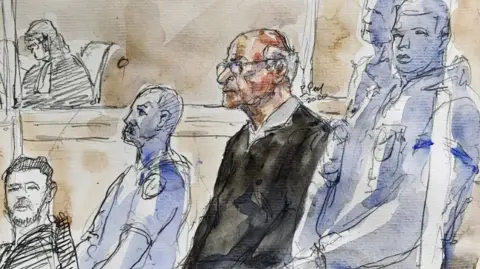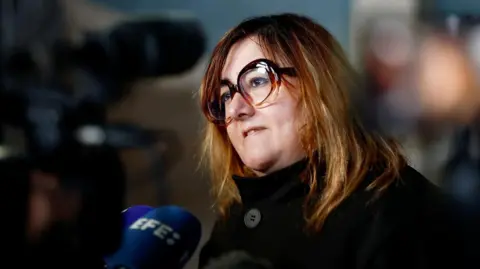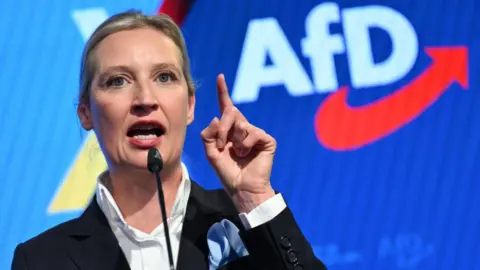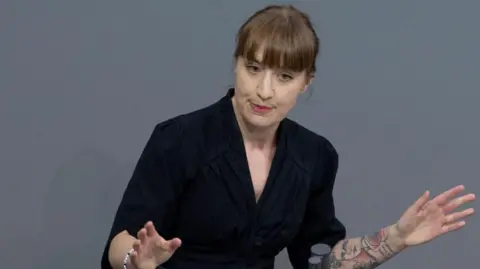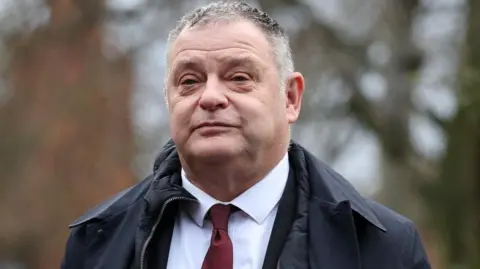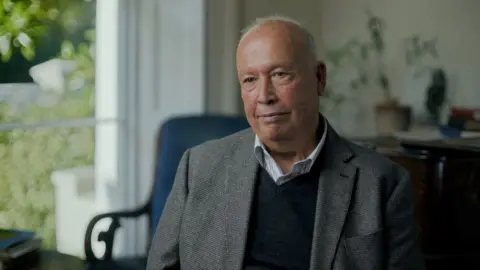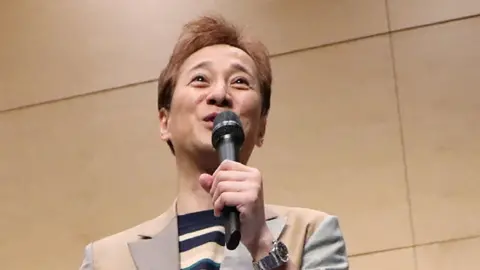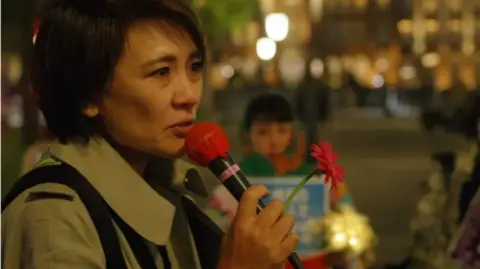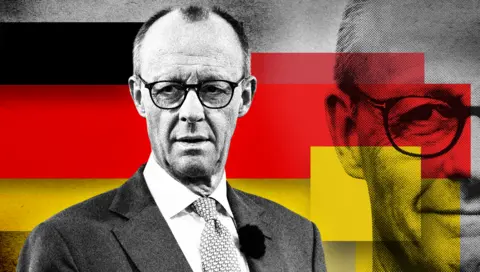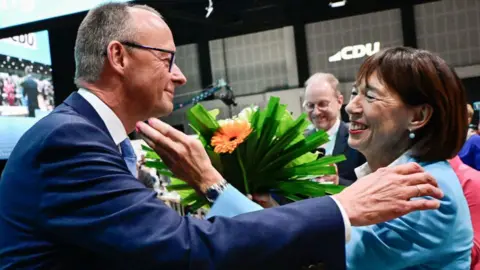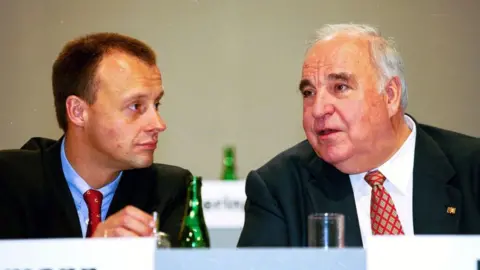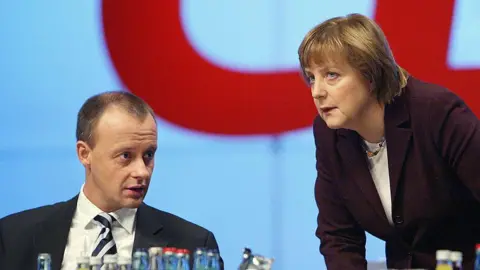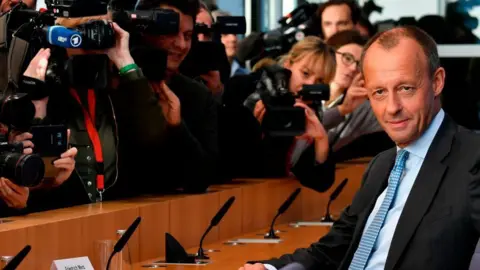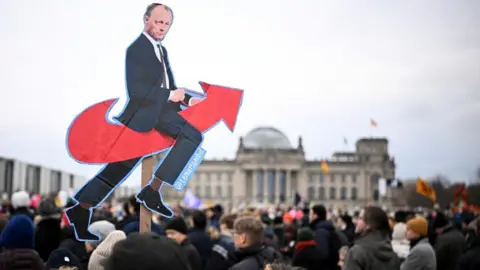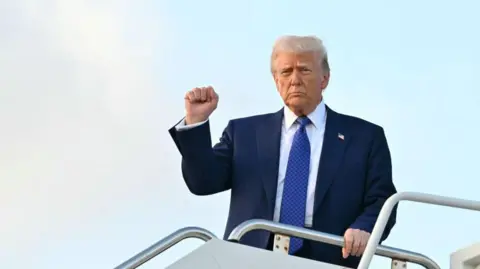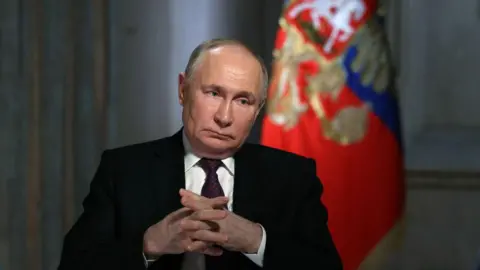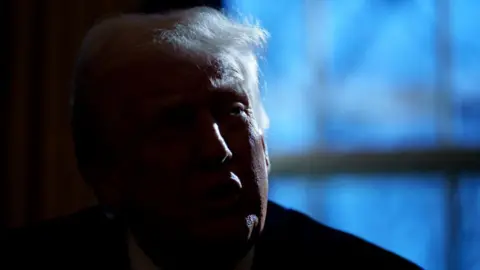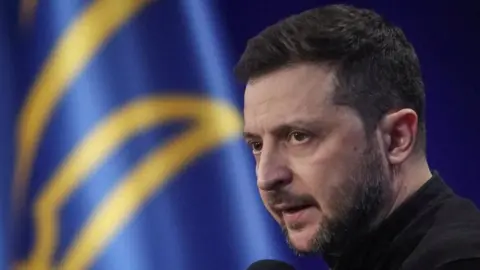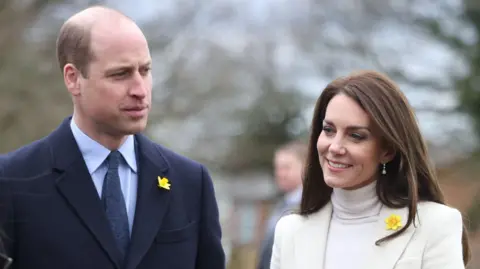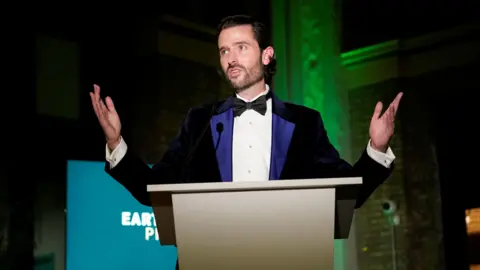Political reporter
Ukraine correspondent
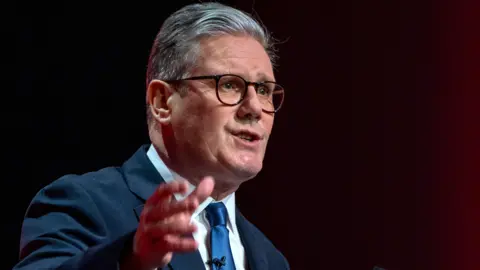 PA Media
PA MediaUS President Donald Trump has “changed the global conversation” on Ukraine, Prime Minister Sir Keir Starmer has said, three years on from Russia’s full-scale invasion.
Sir Keir suggested Trump had “created an opportunity” to end the war, in a speech to an international summit on supporting Ukraine in Kyiv.
The prime minister also appeared to contradict President Trump by saying “Russia does not hold all the cards in this war”.
Sir Keir said the West “must increase the pressure even further” on Russia and announced the UK would impose a new round of sanctions on the country.
The prime minister said more sanctions could push President Vladimir Putin “to a point where he is ready not just to talk, but to make concessions”.
On Monday the UK government said it had imposed more than 100 new sanctions on those who continued to aid the invasion, including companies in China, which is the largest supplier of critical goods for Russia’s military.
Meanwhile, the Home Office has announced a move to widen travel sanctions for Kremlin-linked elites.
The government has described the announcement, which also includes measures against North Korean generals accused of sending troops to fight Ukraine in Russia, as the UK’s largest sanctions package since the early days of the invasion.
Sir Keir said the G7 “should be ready to take on more risk” and a larger role in sanctioning Russian’s oil giants, before speaking to leaders of the group of wealthy countries.
The speech comes ahead of Sir Keir’s meeting with President Trump at the White House on Thursday.
He is expected to discuss the importance of Ukraine’s independence, US security guarantees and European involvement in peace talks when he speaks to Trump.
It is a high-stakes visits as European leaders scramble to put forward their own proposals for ending the war and keeping Russia at bay.
President Trump has been pushing for a quick deal to end the war in Ukraine, and US and Russia have held initial talks, which excluded Ukraine and European countries.
Trump has said he believes Russia has “the cards” in any peace talks to end the war because its military has “taken a lot of territory”.
There have been diplomatic tensions since President Trump called Volodymyr Zelensky a “dictator without elections” last week.
Ukraine’s elections are suspended under martial law, which has been in place since Russia’s full-scale invasion was launched in February 2022.
The prime minister talked about extra sanctions as one way to “deliver an enduring peace” in Ukraine.
He said the other two ways were stepping up UK military support to Ukraine and bringing “our collective strength to the peace effort”.
“President Trump has changed the global conversation over the last few weeks,” Sir Keir said.
“And it has created an opportunity. Now, we must get the fundamentals right.”
He said Ukraine “must have a seat at the table” of peace talks and “a US backstop will be vital to deter Russia from another invasion”.
Sir Keir has spoken on the phone to French President Emmanuel Macron, who is meeting Trump in Washington on Monday.
In the phone call on Sunday, Sir Keir and Macron “compared notes” on how best to approach President Trump, government sources told the BBC.
British officials said the prime minister is keen for European military powers to present a co-ordinated pitch to the US president, and also discuss economic issues, including tariffs.
Foreign Secretary David Lammy, who will join Starmer on his trip to the White House, said the new sanctions “underscore the UK’s commitment to Ukraine”.
“Every military supply line disrupted, every rouble blocked, and every enabler of Putin’s aggression exposed is a step towards a just and lasting peace,” he told the House of Commons.
Conservative shadow foreign secretary Priti Patel said her party backed the government giving Ukraine “everything they need” – including weapons, hardware, and diplomatic muscle – to “decide its own future.”
Patel pressed the government to exceed her party’s manifesto pledge of spending 2.5% of GDP on defence by 2030, and “lead” a charge for Nato nations to boost their military budgets.
Earlier, former Prime Minister Boris Johnson urged President Zelensky to secure Ukraine’s future by signing a minerals deal with the US.
Johnson said he believed Ukraine would sign a “promising” agreement to give the US access to valuable minerals, in return for security guarantees.
Zelensky had rejected a £400bn ($500bn) demand for mineral wealth, but over the weekend, US officials said they expected to sign a deal this week.
In a post on X on Monday, Olha Stefanishyna, Ukraine’s deputy prime minister for European and Euro-Atlantic Integration, said the Ukrainian and US teams were “in the final stages of negotiations regarding the minerals agreement”.
Speaking to the BBC, Johnson – a Zelensky ally who was prime minister when the invasion started – said claims by some Americans that Ukraine had provoked the war were “a complete inversion of the truth”.
He described Trump’s comments as “Orwellian”, and said he might as well have blamed the US for the Japanese attack on Pearl Harbor during World War Two.
But Johnson said it was important to focus on a minerals deal, which he called “the great prize” and suggested could be signed this week.
He rejected suggestions the deal was a “rip-off” and said “what the Ukrainians get from this is a United States commitment under Donald Trump to a free, sovereign and secure Ukraine”.
Additional reporting by Joe Pike, political correspondent






